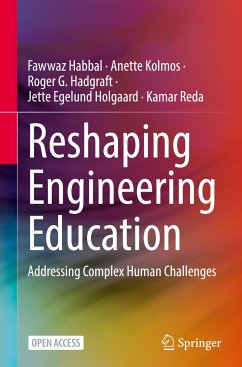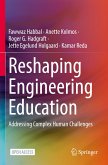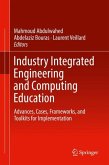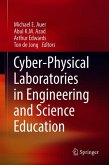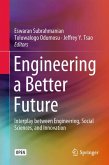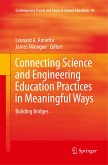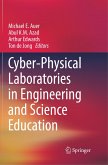Fawwaz Habbal, Anette Kolmos, Roger G. Hadgraft
Reshaping Engineering Education
Addressing Complex Human Challenges
Fawwaz Habbal, Anette Kolmos, Roger G. Hadgraft
Reshaping Engineering Education
Addressing Complex Human Challenges
- Gebundenes Buch
- Merkliste
- Auf die Merkliste
- Bewerten Bewerten
- Teilen
- Produkt teilen
- Produkterinnerung
- Produkterinnerung
This open access book is dedicated to exploring methods and charting the course for enhancing engineering education in and beyond 2023. It delves into the idea that education, coupled with social connections, is indispensable for a more profound comprehension of the world and the creation of an improved quality of life.
The book serves as a conduit for incorporating complex problem-solving into engineering education across various formats. It offers a structured approach for tackling complex issues, comparing an array of techniques for managing complexity within the realm of engineering…mehr
Andere Kunden interessierten sich auch für
![Reshaping Engineering Education Reshaping Engineering Education]() Fawwaz HabbalReshaping Engineering Education30,99 €
Fawwaz HabbalReshaping Engineering Education30,99 €![Industry Integrated Engineering and Computing Education Industry Integrated Engineering and Computing Education]() Industry Integrated Engineering and Computing Education37,99 €
Industry Integrated Engineering and Computing Education37,99 €![Cyber-Physical Laboratories in Engineering and Science Education Cyber-Physical Laboratories in Engineering and Science Education]() Cyber-Physical Laboratories in Engineering and Science Education74,99 €
Cyber-Physical Laboratories in Engineering and Science Education74,99 €![Engineering a Better Future Engineering a Better Future]() Engineering a Better Future37,99 €
Engineering a Better Future37,99 €![Critical Questions in STEM Education Critical Questions in STEM Education]() Critical Questions in STEM Education139,09 €
Critical Questions in STEM Education139,09 €![Connecting Science and Engineering Education Practices in Meaningful Ways Connecting Science and Engineering Education Practices in Meaningful Ways]() Connecting Science and Engineering Education Practices in Meaningful Ways74,99 €
Connecting Science and Engineering Education Practices in Meaningful Ways74,99 €![Cyber-Physical Laboratories in Engineering and Science Education Cyber-Physical Laboratories in Engineering and Science Education]() Cyber-Physical Laboratories in Engineering and Science Education74,99 €
Cyber-Physical Laboratories in Engineering and Science Education74,99 €-
-
-
This open access book is dedicated to exploring methods and charting the course for enhancing engineering education in and beyond 2023. It delves into the idea that education, coupled with social connections, is indispensable for a more profound comprehension of the world and the creation of an improved quality of life.
The book serves as a conduit for incorporating complex problem-solving into engineering education across various formats. It offers a structured approach for tackling complex issues, comparing an array of techniques for managing complexity within the realm of engineering education.
Moreover, the book scrutinizes several complex case studies derived from the United Nation's Sustainable Development Goals. Additionally, it explores intricate problem-solving and curriculum change case studies specific to engineering education from Harvard University, the University of Technology Sydney, and Aalborg University.
The book serves as a conduit for incorporating complex problem-solving into engineering education across various formats. It offers a structured approach for tackling complex issues, comparing an array of techniques for managing complexity within the realm of engineering education.
Moreover, the book scrutinizes several complex case studies derived from the United Nation's Sustainable Development Goals. Additionally, it explores intricate problem-solving and curriculum change case studies specific to engineering education from Harvard University, the University of Technology Sydney, and Aalborg University.
Produktdetails
- Produktdetails
- Verlag: Aalborg University / Springer / Springer Nature Singapore / Springer, Berlin
- Artikelnr. des Verlages: 978-981-99-5872-6
- 1st ed. 2024
- Seitenzahl: 288
- Erscheinungstermin: 31. Dezember 2023
- Englisch
- Abmessung: 241mm x 160mm x 22mm
- Gewicht: 600g
- ISBN-13: 9789819958726
- ISBN-10: 9819958725
- Artikelnr.: 68441727
- Herstellerkennzeichnung Die Herstellerinformationen sind derzeit nicht verfügbar.
- Verlag: Aalborg University / Springer / Springer Nature Singapore / Springer, Berlin
- Artikelnr. des Verlages: 978-981-99-5872-6
- 1st ed. 2024
- Seitenzahl: 288
- Erscheinungstermin: 31. Dezember 2023
- Englisch
- Abmessung: 241mm x 160mm x 22mm
- Gewicht: 600g
- ISBN-13: 9789819958726
- ISBN-10: 9819958725
- Artikelnr.: 68441727
- Herstellerkennzeichnung Die Herstellerinformationen sind derzeit nicht verfügbar.
Dr. Fawwaz Habbal is a Senior Lecturer in Applied Physics at the Harvard School of Engineering and Applied Sciences (SEAS), United States. He currently conducts research in nanophotonics and takes an active interest in addressing open-ended human challenges. At SEAS, Dr. Habbal served in various administrative roles, including the Director of Graduate Engineering Studies and the Executive Dean for Education and Research. He has been a driving force behind numerous research and education initiatives. He co-founded the Harvard Learning Incubator program and served as co-director of the Master in Design Engineering (MDE) program. The MDE program equips students with the skills to tackle and mitigate open-ended human challenges effectively. Dr. Habbal has devised unique pedagogical strategies emphasizing active learning, computational methods, and studio-based instruction. This approach helps students grapple with complex, open-ended human challenges. Inacknowledgment of his substantial contributions to academia and his embrace of diverse cultural perspectives, the Ulsan National Institute of Science and Technology in the Republic of Korea awarded him an honorary doctorate in engineering. Before joining SEAS, Dr. Habbal established startups in the field of digital imaging. His corporate tenure includes a role as Corporate Vice President at Polaroid Corporation, overseeing research and product design. In addition, he served as a Senior Research and Engineering Fellow for the same corporation. Professor Anette Kolmos is Professor in Engineering Education and Problem- and Project-based Learning (PBL), and Founding and Former Director for the UNESCO category 2 Centre: Aalborg Centre for Problem Based Learning in Engineering Science and Sustainability. She was Chair holder for UNESCO in Problem Based Learning in Engineering Education, Aalborg University, Denmark, from 2007-2014. Amongst other professional appointments, she was also President of SEFI 2009-2011 (European Society for Engineering Education), and Founding Chair of the SEFI-working group on Engineering Education Research. Anette was awarded the IFEES Global Award for Excellence in Engineering Education, 2013 and the SEFI fellowship in 2015. During the last 20 years, her research focus within Engineering Education includes gender and technology, project based and problem- based curricula, change from traditional to project organized and problem- based curricula, development of transferable skills in PBL and project work, and methods for staff development. She is Associate Editor for the European Journal of Engineering Education and was Associate Editor for Journal of Engineering Education (ASEE). Professor Roger Hadgraft is a civil engineer with more than 30 years of experience in improving engineering education. He has published many papers on problem- and project-basedlearning, and the use of online technology to support student-centered learning to meet the needs of engineering employers. He was instrumental in introducing a project-based curriculum in civil engineering at Monash University and in several disciplines at RMIT (the Royal Melbourne Institute of Technology) in Melbourne, Australia. He established the Master of Sustainable Practice and Bachelor of Sustainable Systems Engineering, both at RMIT. Roger was an Australian Learning and Teaching Council Discipline Scholar and has been a member of several national learning and teaching projects. He has consulted on problem- and project-based learning to universities both nationally and internationally. In his current role at University of Technology Sydney, Australia, he is leading the transformation of the curricula using studios to embed the development of future workplace skills, with an emphasis on integration of technical and social skills. Jette Egelund Holgaard is Associate Professor within the field of PBL in Engineering Education. She has an M.Sc. in Environmental Planning and a Ph.D. in Environmental Communication. Dr. Holgaard is affiliated with the Aalborg Centre for Problem based Learning in Engineering Science and Sustainability under the auspices of UNESCO (UCPBL). Her research in UCPBL is related to the Technical Faculty of IT and Design, the Faculty of Engineering and Science, and the Institute of Advanced Studies in PBL, Aalborg University. During her career, she has had several leading positions at Aalborg University. Her current research has a specific focus on the relation between PBL competences, interdisciplinarity and societal challenges in the reshaping of engineering education. She builds on prior research in sustainability science to frame societal challenges for engineers in the context of the UN Sustainable Development Goals. She has more than 130 publications related to the beforementioned research fields. Kamar Reda is a bioengineer with a keen interest in studying complex human and natural systems. She has actively taught courses that delve into systems and design thinking, focusing on uncovering the underlying causes of human conflicts and environmental challenges. More recently, Ms. Reda has dedicated her efforts to exploring novel methods and processes for educating future engineers, specifically addressing the challenges presented by AI, environmental issues, and economic concerns. She has also developed strategies for remote education and problem-solving, incorporating these approaches in practical settings to bring valuable insights. Ms. Reda is currently engaged in research towards obtaining a PhD in Bioengineering at Harvard University. This research reflects her passion for integrating principles from engineering and biology to address complex challenges within the field of bioengineering. Her teaching experiences, research pursuits, and engagement with various educational topics enable her to offer practical solutions and a comprehensive understanding of education, learning, and interdisciplinary problem-solving.
Introduction.- A Systems Approach to Addressing Human Challenges.- Design for Complexity.- New Competencies for Systems Thinking.- Towards a Comprehensive Pedagogy.- Teaching and Learning Strategies.- Generic Competencies.- Educational Transformation.- Engineers and Practice at Harvard.- Problem and Project-Based Learning at Aalborg.- Studios Reshape Engineering Curricula.- Invitation to Change.
Introduction.- A Systems Approach to Addressing Human Challenges.- Design for Complexity.- New Competencies for Systems Thinking.- Towards a Comprehensive Pedagogy.- Teaching and Learning Strategies.- Generic Competencies.- Educational Transformation.- Engineers and Practice at Harvard.- Problem and Project-Based Learning at Aalborg.- Studios Reshape Engineering Curricula.- Invitation to Change.

